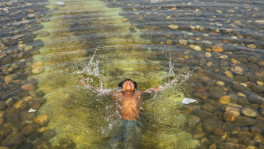Freedom of praise is unlimited!
You have freedom of expression. But do you have the freedom after expression? No. If you become “unreasonable” to express yourself, you will have to face the music, like some journalists and individuals are facing now.

Strict enforcement of some provisions of the digital security law seems to have appeared as a major threat to freedom of expression. But the solution is simple. You can easily keep yourself out of the purview of the legal provisions, meaning you may stay above this law! It can not touch you if you opt for a strategy of praising everything the administration is doing without allowing your curious mind to work.
And also praise the people who hold the power locally and nationally without questioning any of their actions. If you can do so, you will enjoy freedom unfettered. No stringent legal provision will appear to be a threat to your freedom of expression. So, let freedom of expression be turned into freedom of praise. This can be a new normal in the time of the coronavirus pandemic.
Is there ever any example that a person has landed in jail for praising the authorities? No. Those who landed in jail recently after being sued under the digital security law must have curious minds that caused problems for them. They have posted or shared something on social media in efforts to criticise either the administration or people who hold power. Their social media posts allegedly defamed them. So, the law has taken its own course. They should have known that the hand of the law is so long that they could not stay beyond its reach. So, for their fate, none should blame the administration or the police. They are suffering the consequences for their curious minds.
None should forget that the state is always ready to defend people of name and fame and people who hold powers. This is why it has made the law with stringent provisions.
The British rulers of Indian were not so careful about people's "fame" and "image". The provision of the Code of Criminal Procedure of 1898 did not empower police to arrest anybody including journalists, writers and publishers of any books or newspapers if they wrote or said anything defamatory. This law still remains in force. And the police need an arrest warrant issued by the court to take action. And according to the Penal Code of 1860 one may be punished with simple imprisonment for a term which may extend to two years, or with fine, or with both for defaming others.
Moreover, the Code of Criminal Procedure has made a provision that only people who feel defamed by any news or write up may file the case with the court. It does not allow any other person to file the case on behalf of the allegedly defamed people.
But our government did not rely only on the legal provisions made by the British rulers to protect people's "image" and "fame". The provisions made by the British rulers are anachronistic. We need something digital. So it framed the information and communication technology act of 2006 including a harsh provision--section 57. This law allowed anybody to file the case and police was allowed to arrest an accused without permission of the court. According to the provision, one may be punished up to 14 years to imprisonment for defaming any person.
Facing widespread criticism, Section 57 was repealed. But we have a new provision in the digital security law that is also harsh. According to this provision, a person may be sentenced to imprisonment up to three years or with a fine of Tk 5 lakh or both for defaming a person using a digital device. If a person commits the offence for a second time, he will have to face double punishment. This law also allows filing proxy cases.
So, in the time of the pandemic we should curb our curious minds and respect our legal framework.
As we are maintaining physical distance in the time of pandemic to protect ourselves from the infectious disease, so should we also maintain a safe distance from the digital security law. We may either remain silent or follow the new normal: freedom of praise!
We do not need so much information regarding the spread of the virus and the administrative measures to contain the virus and mitigate people's suffering caused by the shutdown. Let's gather strength to fight the enemy in the dark. The virus is invisible so why do we need light [information] to fight it?
We are living in a modern and enlightened age. We must be capable of fighting the pandemic without the help of the media for more information. What is the need for information if it annoys our curious minds and makes them behave "unreasonably"?
The freedom of the expression causes conflict in the society. USA is the latest example. We are seeing a conflict between the Trump administration and the media there. People in many areas have taken to the streets protesting the government's shutdown measures. This causes unrest in the society. Both people and the media should have praised every action taken by the Trump administration. Yet, they are lucky as they do not have any digital security law like our one.
Economists and medical experts have been saying for the last two months that the pandemic has changed economics, our behavior and society itself. We have to live at least for a year or more with the virus until a vaccine is developed. We will not be able to return soon to normalcy where we were before the outbreak of the virus. So, why don't we accept the new normal: freedom of praise by discarding the pre pandemic one—freedom of expression?
Think again. The freedom of expression, though one of your constitutional rights, is subject to some "reasonable" restrictions. You have freedom of expression. But do you have the freedom after expression? No. If you become "unreasonable" to express yourself, you will have to face the music as some journalists and individuals are facing now.
In contrast, the freedom of praise is unlimited; unfettered. The sky is the limit if you follow the new normal—freedom of praise. In the time of pandemic, you have already restricted yourself at home. In such a situation, freedom of praise can open a new window for you; it is the window that offers you unlimited freedom. Think again, which one would you prefer?
The writer is a journalist


 Keep updated, follow The Business Standard's Google news channel
Keep updated, follow The Business Standard's Google news channel















